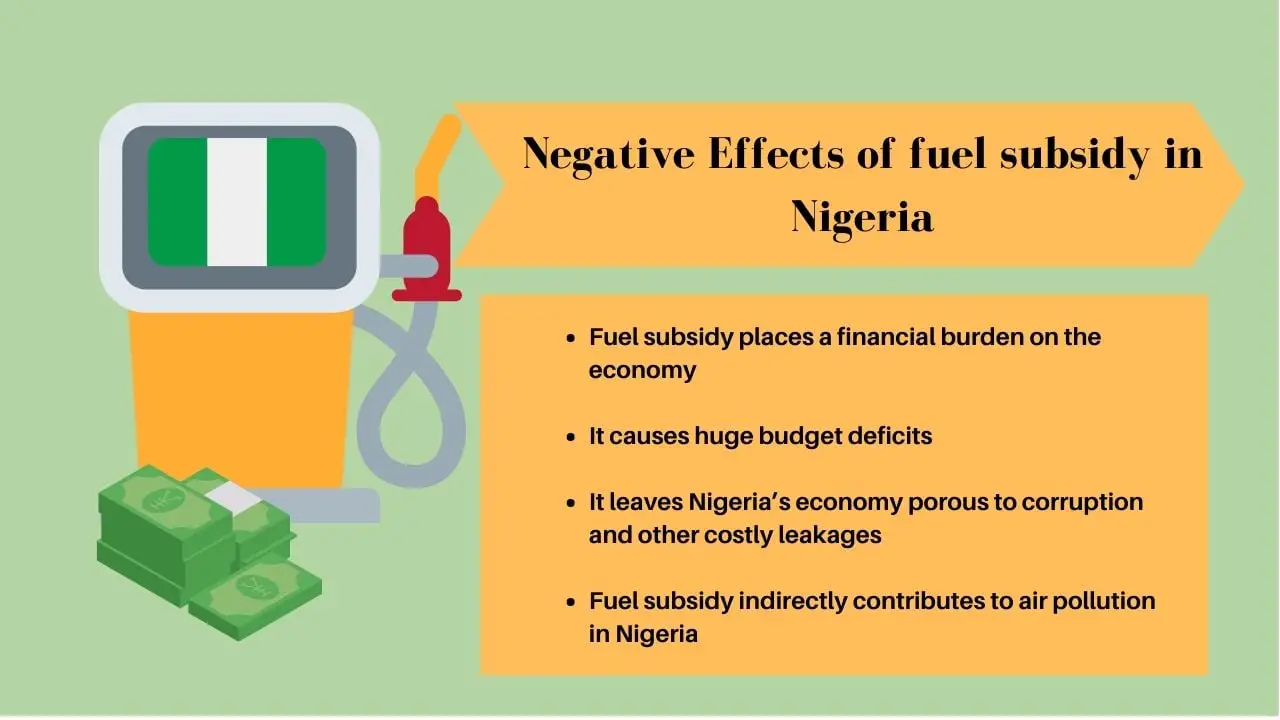What are the negative effects of fuel subsidy in Nigeria? Fuel subsidy was first introduced in Nigeria following the oil crisis in 1973. This was a form of government intervention to cushion the landed cost of petroleum products imported into the country. However, over the years, this financial aid has become a very controversial issue in the country. In as much as fuel subsidy was introduced to ease the burden of high fuel prices on the masses, it, no doubt comes with some negative effects that cannot be ignored.
One of the negative effects of fuel subsidy in Nigeria that is causing so much concern at the moment is, the burden of sustaining fuel subsidies annually has become quite heavy on the Government. It is no longer news that the Nigerian Government has resorted to funding fuel subsidies from borrowing. Is this what is best for the Nation at this point? Will the Federal Government be saving the nation’s economy by implementing the removal of fuel subsidy? In this article, we will be discussing some of the negative effects of fuel subsidy in Nigeria and why removing it may be a good approach to the nation’s development.

Related: What is Excess Crude Account (ECA)?
Fuel Subsidy in Nigeria
Fuel subsidy in Nigeria is a form of government intervention wherein the Federal Government pays a fraction of the price of fuel (also known as Premium Motor Spirit-PMS or petrol) to oil companies so that the price of fuel may be affordable to Nigerian citizens. This has been in place in Nigeria since the 1970s in order to ensure stability in domestic fuel prices and enable the consumption of fuel at an affordable price.
Nigeria produces crude oil but doesn’t have the capacity to refine it due to the fact that the country’s domestic refineries are down and barely function. Hence, crude oil is exported and sold, and then the country imports refined petroleum products to meet its domestic consumption. When the refined petroleum products are shipped in, the landed cost is way expensive for an average Nigerian to afford and this is why the Government introduced fuel subsidy in Nigeria, in order to sell petrol to Nigerians below the international price. This has been in place since the 1970s till date.
What the Government does is fix the price of petroleum products for consumers below the international price and then pay for the difference with government resources. That is, assuming the landed cost of petrol is roughly N315 per liter, the federal government marks a price of N113 per liter as the affordable price for an average Nigerian and then pays the difference of N202 as a fuel subsidy. The main reason fuel subsidy was introduced by the Nigerian government was to minimize the impact of the rising international oil prices on Nigerians.
However, over the years, Nigeria has spent a lot of money sustaining fuel subsidies. According to the Nigeria Extractive Industries Transparency Initiative (NEITI), Nigeria spent N13.7 trillion on petrol subsidy payments from 2005 to 2020. The cost of fuel subsidies has continued to grow aggressively due to the rise in the cost of fuel and Nigeria’s increased fuel consumption. The Nigerian National Petroleum Company Limited (NNPCL) as of February 18, 2023, disclosed that Nigeria spends more than N400 billion each month on fuel subsidy.
Judging by the figures, it is evident that the government will likely spend more on fuel subsidies in the coming years, just to keep domestic prices low. Due to the unsustainability of this, the Nigerian government in recent times has made reforms concerning the removal of fuel subsidies in Nigeria. Mrs. Zainab Ahmed (Nigeria’s Minister of Finance, Budget, and National Planning) on January 4, 2023, at a public presentation of details of the 2023 budget in Abuja, disclosed that the Federal Government has made provisions of N3.36 trillion naira to cover fuel subsidy payments for the first six months of 2023. Therefore, the funding of fuel subsidy stops by June 2023.
See also: Developing Countries Characteristics
Negative Effects of Fuel Subsidy in Nigeria
- Fuel subsidy places a financial burden on the economy
- It causes huge budget deficits
- It leaves Nigeria’s economy porous to corruption and other costly leakages
- Fuel subsidy indirectly contributes to air pollution in Nigeria
Many Nigerians are finding it hard to welcome the idea of ending fuel subsidy in Nigeria because of the various disadvantageous effects that the fuel subsidy removal will leave on the masses. The fact is, a lot of Nigerians only see the convenience that comes with fuel subsidy and fails to see some of the negative effects of fuel subsidy in Nigeria. Let’s look at some of these negative effects and reasons why the removal of fuel subsidy may not be such a bad idea.
Fuel subsidy places a financial burden on the economy
One of the negative effects of fuel subsidy in Nigeria is that it places a financial burden on the economy. The year-in and year-out payment of fuel subsidy ties down a large amount of government spending. Hence, places a financial burden on the country’s economy, especially when there is a huge difference between the fuel prices at the international market and the subsidized domestic retail price of fuel.
The fact that the country is not generating enough revenue to afford the payment of fuel subsidies already creates a huge financial burden on the economy. It was said that in 2022, the Federal Government of Nigeria spends N18.397 billion daily on petrol subsidy. This is oftentimes financed by some combination of higher public debt, crowding out of potentially productive public spending (on health, education, infrastructure, etc), and higher tax burdens.
Sustaining fuel subsidy in Nigeria have caused a drag on the country’s economic growth, especially as the Federal Government has been funding the payment of the subsidy by borrowing. It is bad economics to take a loan to fund consumption and it is even much worse that the country is funding the refining of the same crude oil that it produces. Hence, taking a loan to fund fuel subsidy will cause a long-term financial burden on the country’s economy.
It causes huge budget deficits
One of the negative effects of fuel subsidy in Nigeria is that it causes huge budget deficits. Every year, the Nigerian government runs huge budget deficits because expenditures on fuel subsidy exceed the revenues that the government get from taxes and other sources. This could have been avoided if the funds Nigeria budgeted for fuel subsidies every year were allocated to other important projects.
The government will experience a budget deficit because huge amounts of money are used to finance non-durable consumption items like fuel instead of using it to spur investment in activities that raise the productive capacities of the economy (such as health, education, infrastructure, and entrepreneurship).
Fuel subsidy could be seen as inequitable, in the sense that it transfers the national wealth to those who own several cars and add little or no value to the national economy. Instead of fuel subsidies, the government can invest massively in public transportation and increase the transport allowances of public-sector workers. The money should be targeted at strategic sectors of the economy.
It leaves the economy porous to corruption and other costly leakages
In as much as the fuel subsidy was provided to serve the social goal of reducing the cost of fuel and increasing its availability among the poor, it has left Nigeria’s economy porous to corruption and other costly leakages. One of the negative effects of fuel subsidy in Nigeria is that it imposes large economic costs resulting from certain negative externalities.
For example, due to fuel subsidies, a liter of petrol is cheaper in Nigeria compared to some neighboring countries like Togo and the Benin Republic. This gives room for money-sniffing capitalists to take advantage of the price differential and smuggle the fuel to neighboring countries for sale, in order to make more profit. In such instances, it is evident that the Nigerian government is not just subsidizing fuel for its citizens, but is also subsidizing for those in these neighboring countries.
Corruption is another aspect of the negative externality resulting from fuel subsidy. The money used to pay fuel subsidy are sometimes mismanaged or unaccounted for due to the inexplicable record of the volume of fuel consumed by Nigerians and the inaccuracies in the record of the barrels of refined petroleum products imported into the country.
Fuel subsidy indirectly contributes to air pollution in Nigeria
Removing fuel subsidies would be good from an environmental perspective. One of the negative effects of fuel subsidy in Nigeria is that it indirectly influences the high petrol consumption in the country. Petrol is one of the fossil fuels that is generally known for its Carbon dioxide (Co2) emissions. The emissions of Co2 are the main contributors to climate change. They contribute to environmental damage, cause more premature deaths through local air pollution, and increase atmospheric greenhouse gas concentrations.
The subsidized price of petrol makes fuel affordable to a large percentage of Nigerians to use in their vehicles, generators, etc, thus causing air pollution. The removal of fuel subsidy will definitely help to address this environmental issue, especially with regard to CO2 emissions, and local air pollution. This will, in turn, save lives and improve the quality of health of the general public.
Around the world, there is a global focus to decarbonize energy systems by achieving a transition to renewables and other environment-friendly energy sources. Hence, Nigeria still subsidizing fuel at this time and age gives an impression to the rest of the world that the country is not part of the global actions taken toward reducing GHG emissions and mitigating global warming and climate change.
Fuel subsidy encourages the overproduction and overconsumption of fuel which is unfriendly to the environment and this sends the wrong signal to potential investors that are keen on clean energy.
Last Updated on November 2, 2023 by Nansel Nanzip BongdapObotu has 2+years of professional experience in the business and finance sector. Her expertise lies in marketing, economics, finance, biology, and literature. She enjoys writing in these fields to educate and share her wealth of knowledge and experience.
